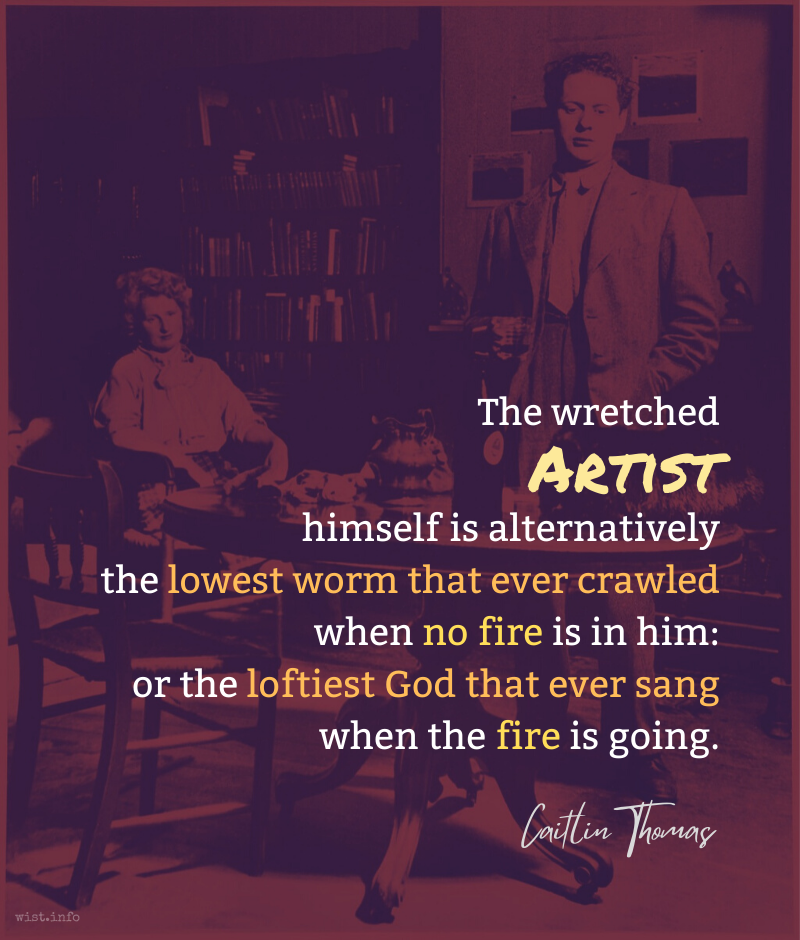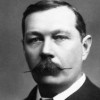The neurotic longs to touch bottom, so at least he won’t have that to worry about anymore.
Mignon McLaughlin (1913-1983) American journalist and author
The Neurotic’s Notebook, ch. 10 (1963)
(Source)
Quotations about:
depression
Note not all quotations have been tagged, so Search may find additional quotes on this topic.
The neurotic doesn’t know how to cope with his emotional bills; some he keeps paying over and over, others he never pays at all.
Mignon McLaughlin (1913-1983) American journalist and author
The Neurotic’s Notebook, ch. 9 (1963)
(Source)
Are you happy now? Are you likely to remain so till this evening? or next week? or next month? or next year? Then why destroy present happiness by a distant misery, which may never come at all, or you may never live to see it? for ever substantial grief has twenty shadows, and most of them shadows of your own making.
Sydney Smith (1771-1845) English clergyman, essayist, wit
Memoir of the Reverend Sydney Smith, by His Daughter, Lady Holland, Vol. 1, ch. 11 (1855)
(Source)
Advice for fighting melancholy / depression / anxiety by "taking short views of life" and not borrowing trouble.
Hope is the feeling we have that the feeling we have is not permanent.
Mignon McLaughlin (1913-1983) American journalist and author
The Neurotic’s Notebook, ch. 5 (1963)
(Source)
There is no logical explanation for despair. You can no more reason yourself into cheerfulness than you can reason yourself an extra six inches in height. You can only be better prepared.
Stephen Fry (b. 1957) British actor, writer, comedian
Speech, Samaritans annual report launch, London (1996-05-17)
Regarding the emotional breakdown which led him once to abandon a play in mid-production, and subsequently again contemplate suicide. The Samaritans are a suicide-prevention group.
Quoted in Gary Younge, "Enter Fry, centre stage, for bravura performance on depression and suicide," The Guardian (1996-05-18).
There is nothing like employment, active indispensable employment, for relieving sorrow. Employment, even melancholy, may dispel melancholy, and her occupations were hopeful.
Hope is the feeling we have that the feeling we have is not permanent.
Mignon McLaughlin (1913-1983) American journalist and author
The Neurotic’s Notebook, ch. 5 (1963)
(Source)
This phrase is often cited to Jean Kerr. That's because she paraphrases it in her play, Finishing Touches, Act 3 (1974):
FELICIA: Do you know the book The Neurotic's Notebook? There's a line in it I say to myself when I get discouraged. It goes: "Hope is the feeling you have that the feeling you have isn't permanent."
A good laugh overcomes more difficulties and dissipates more dark clouds than any other one thing.
Laura Ingalls Wilder (1867-1957) American writer
“‘Thoughts are Things,'” Missouri Ruralist (5 Nov 1917)
(Source)
Reprinted in Stephen Hines, ed., Laura Ingalls Wilder - Farm Journalist (2007).
Neurotic: someone who can go from the bottom to the top, and back again, without ever once touching the middle.
Mignon McLaughlin (1913-1983) American journalist and author
The Second Neurotic’s Notebook, ch. 4 (1966)
(Source)
I feel like an inadequate machine, a machine that breaks down at crucial moments, grinds to a dreadful halt, “won’t go,” or, even worse, explodes in some innocent person’s face.
May Sarton (1912-1995) Belgian-American poet, novelist, memoirist [pen name of Eleanore Marie Sarton]
Journal of a Solitude, “September 15th” (1973)
(Source)
When you’re downed by this affliction, if there were a curative magic wand on the table eight feet away, it would be too much trouble to go over and pick it up. […] In the depths of the malady, getting a stamp on a letter is a day’s work.
Dick Cavett (b. 1936) American writer and critic
“Smiling Through,” New York Times (27 Jun 2008)
(Source)
Regarding depression.
The wretched Artist himself is alternatively the lowest worm that ever crawled when no fire is in him: or the loftiest God that ever sang when the fire is going.
Caitlin Thomas (1913-1994) British author, wife of Dylan Thomas [née Macnamara]
Not Quite Posthumous Letter to My Daughter (1963)
(Source)
The worst days of darkness through which I have ever passed have been greatly alleviated by throwing myself with all my energy into some work relating to others.
James A. Garfield (1831-1881) US President (1881), lawyer, lay preacher, educator
Letter to B. A. Hinsdale (30 Apr 1874)
(Source)
He imagined the pain of the world to be like some formless parasitic being seeking out the warmth of human souls wherein to incubate and he thought he knew what made one liable to its visitations. What he had not known was that it was mindless and so had no way to know the limits of those souls and what he feared was that there might be no limits.
Cormac McCarthy (1933-2023) American novelist, playwright, screenwriter
All the Pretty Horses (1992)
(Source)
By virtue of depression, we recall those misdeeds we buried in the depths of our memory. Depression exhumes our shames.
Emile Cioran (1911-1995) Romanian philosopher and essayist [E.M. Cioran]
Anathemas and Admirations, ch. 11 “That Fatal Perspicacity” (1986) [tr. R. Howard (1991)]
(Source)
Into each life some rain must fall,
Some days must be dark and dreary.
“The first ten million years were the worst,” said Marvin, “and the second ten million years, they were the worst, too. The third ten million years I didn’t enjoy at all. After that I went into a bit of a decline.”
KATHERINE: He made her melancholy, sad, and heavy,
And so she died. Had she been light like you,
Of such a merry, nimble, stirring spirit,
She might ha’ been a grandam ere she died.
And so may you, for a light heart lives long.William Shakespeare (1564-1616) English dramatist and poet
Love’s Labour’s Lost, Act 5, sc. 2, l. 15ff (5.2.15-19) (c. 1595)
(Source)
To Rosaline.
Don’t commit suicide, because you might change your mind two weeks later.
Art Buchwald (1925-2007) American humorist, columnist
Leaving Home (1995)
A personal mantra Buchwald used to combat his intermittent depression. Possibly borrowed from Voltaire.
When the spirits are low, when the day appears dark, when work becomes monotonous, when hopes hardly seems worth having, just mount a bicycle and go for a good spin down the road, without thought of anything but the ride you are taking.
When I was young, for two or three years the light faded out of the picture. I did my work. I sat in the House of Commons, but black depression settled on me. It helped me to talk to Clemmie about it. I don’t like standing near the edge of a platform whn an express train is passing through. I like to stand right back and if possible to get a pillar between me and the train. I don’t like to stand by the side of a ship and look down into the water. A second’s action would end everything. A few drops of desperation.
In short, we can judge by nothing but Appearances, and they are very apt to deceive us. Some put on a gay chearful Outside, and appear to the World perfectly at Ease, tho’ even then, some inward Sting, some secret Pain imbitters all their Joys, and makes the Balance even: Others appear continually dejected and full of Sorrow; but even Grief itself is sometimes pleasant, and Tears are not always without their Sweetness: Besides, Some take a Satisfaction in being thought unhappy, (as others take a Pride in being thought humble,) these will paint their Misfortunes to others in the strongest Colours, and leave no Means unus’d to make you think them thoroughly miserable; so great a Pleasure it is to them to be pitied; Others retain the Form and outside Shew of Sorrow, long after the Thing itself, with its Cause, is remov’d from the Mind; it is a Habit they have acquir’d and cannot leave.
Benjamin Franklin (1706-1790) American statesman, scientist, philosopher, aphorist
“A Dissertation on Liberty and Necessity” (1725)
(Source)
When I was young, for two or three years the light faded out of the picture. I did my work. I sat in the House of Commons, but black depression settled on me. It helped me to talk to Clemmie about it. I don’t like standing near the edge of a platform when an express train is passing through. I like to stand right back and if possible to get a pillar between me and the train. I don’t like to stand by the side of a ship and look down into the water. A second’s action would end everything. A few drops of desperation.
If you can’t stop the bad thoughts from coming to visit, at least you can make fun of them while they’re hanging around.
The money was all appropriated for the top in the hopes that it would trickle down to the needy. Mr. Hoover was an engineer. He knew that water trickles down. Put it uphill and let it go and it will reach the driest little spot. But he didn’t know that money trickled up. Give it to the people at the bottom and the people at the top will have it before night, anyhow. But it will at least have passed through the poor fellows hands.
Will Rogers (1879-1935) American humorist
“And Here’s How It All Happened,” St. Petersburg Times (1932-11-27)
(Source)
An abbreviated form, used in memes, omits sentences 2-4, but is often presented in text as the full quotation.
Alternately dated 26 Nov 1932, and Nov 1928, but the newspaper image for the article is clearly dated 27 Nov 1932.
When Carlini was convulsing Naples with laughter, a patient waited on a physician in that city, to obtain some remedy for excessive melancholy, which was rapidly consuming his life. The physician endeavored to cheer his spirits, and advised him to go to the theater and see Carlini. He replied, “I am Carlini.”
Never give way to melancholy; resist it steadily, for the habit will encroach.
Sydney Smith (1771-1845) English clergyman, essayist, wit
Memoir of the Reverend Sydney Smith, by His Daughter, Lady Holland, Vol. 1, ch. 10 (1855)
(Source)
In chapter 11 is a parallel quotation from Smith: "Never give way to melancholy: nothing encroaches more; I fight against it vigorously."
But Lady Holland observes that in Smith's notebook he also wrote, "I wish I were of a more sanguine temperament; I always anticipate the worst."
As a confirmed melancholic, I can testify that the best and maybe only antidote for melancholia is action. However, like most melancholics, I suffer also from sloth.
Edward Abbey (1927-1989) American anarchist, writer, environmentalist
A Voice Crying in the Wilderness, ch. 4, “Life and Death and All That” (1989)
(Source)
A joyful heart helps healing,
but a broken spirit dries up the bones.The Bible (The Old Testament) (14th - 2nd C BC) Judeo-Christian sacred scripture [Tanakh, Hebrew Bible], incl. the Apocrypha (Deuterocanonicals)
Proverbs 17:22 [CEB (2011)]
Alternate translations:
A merry heart doeth good like a medicine; but a broken spirit drieth the bones.
[KJV (1611)]
Being cheerful keeps you healthy. It is slow death to be gloomy all the time.
[GNT (1976)]
A glad heart is excellent medicine, a depressed spirit wastes the bones away.
[NJB (1985)]
A cheerful heart is a good medicine,
but a downcast spirit dries up the bones.
[NRSV (2021 ed.)]
A joyful heart makes for good health;
Despondency dries up the bones.
[RJPS (2023 ed.)]






























